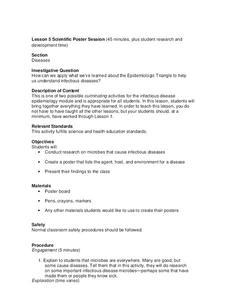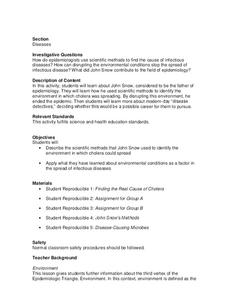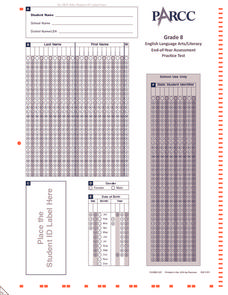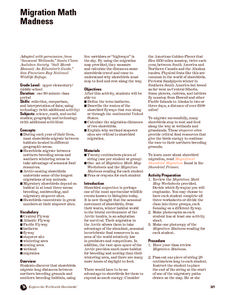National Energy Education Development Project
Great Energy Debate
If someone yelled for eight years and eight months, they could produce enough energy to heat one cup of coffee. A activity on energy encourages scholars to research 10 different energy sources in groups before playing a game. Twenty...
Columbus City Schools
Photosynthesis and Respiration
Thirty percent of the world's oxygen is produced by rainforests found throughout the world. Seventh grade learners explore the processes of photosynthesis and respiration through 10 days of labs, manipulatives, and discussions. They...
US National Library of Medicine
Science and Society: Preventing the Spread of Disease
Looking for a valuable resource on the spread of infectious diseases? Here is a instructional activity in which pupils simulate the spread of diseases and learn about how to prevent them from spreading. Class members read case studies...
Centers for Disease Control and Prevention
Learning about Giardia and Giardiasis - Research and Role Play
Young biologists begin researching giardia and completing an epidemiologic triangle. They then portray either a parent of a sick child or a physician in a fun role play activity.
Centers for Disease Control and Prevention
Scientific Poster Session
An informative lesson offers young scientists the chance to research a microbe and create an epidemiologic triangle for a poster session and presentation.
Centers for Disease Control and Prevention
Diseases
During a cholera outbreak, scientists presented two theories; one theory was based on miasma and the other on germs and contaminated water. The lesson looks at the scientific process for finding the real culprit.
University of Georgia
Land Biomes Project
Challenge scholars to research a biome and create a presentation for the producers of Survivor to choose their ecosystem for the next season's show. The materials include outlines, worksheets, and grading rubrics for individuals as well...
Have Fun Teaching
Scientific Method
Encourage your students' inner scientist by conducting experiments and recording their findings. This printable incorporates every part of the scientific method into an easy-to-read outline of experimental questions, research,...
Curated OER
End-of-Year Practice Test (Grade 8 ELA/Literacy)
Common Core testing on your mind? Ease your class into the test by requiring pupils to take this practice test. The focus of this test is reading. Learners read several passages, both literary and informational, and respond to multiple...
Institute of Electrical and Electronics Engineers
Shake it up with Seismographs!
Shake things up in your STEM or earth science classroom when you have small groups construct their own seismographs. A reading assignment on the history of seismographs, the Richter scale, and current technology sets the stage for the...
Institute of Electrical and Electronics Engineers
Failure: Seeds of Innovation
"If at first you don't succeed, try, try again!" Through this assignment, emerging engineers examine how failed experiments are simply part of the process of an outstanding design. They begin with some reading about the microwave oven,...
Institute of Electrical and Electronics Engineers
Chair Lift Challenge
During the Winter Olympics, this would be an engaging task to include in your STEM lesson. Design teams plan, construct, and test a miniature ski lift that can carry a pingpong ball up and down a rope line without falling out. With this...
Institute of Electrical and Electronics Engineers
Pendulum Time
Take your time with this lesson. Junior engineers read about different types of clocks and then work together to build a pendulum time-keeper. There are no hints as to how they might go about accomplishing this complex task, so you may...
Institute of Electrical and Electronics Engineers
Radio Reception and Transmission
After reading about radio transmission, application, and the difference between AM and FM, small teams of engineers use a kit to construct an FM radio and then send and receive broadcasts. This is an ideal activity for middle school STEM...
Institute of Electrical and Electronics Engineers
Arduino Blink Challenge
Emerging engineers read about Arduino software and how it can be used. Then they follow a nine-step tutorial to connect an Arduino board to a computer and put it to work! The objective is to code a program that will cause an LED to...
Institute of Electrical and Electronics Engineers
Stop and Go
It's "Green light, go!" with this lesson! STEM classes are illuminated with the history of traffic signals and how the engineering design has improved over time. They also learn about patents for new inventions. Finally, they research in...
Prince William Network
The Incredible Journey
Divide your school gym into breeding grounds and non-breeding grounds so that your zoologists can play a game simulating the seasonal migration of shorebirds. Players pick one of the included game cards and follow its directions, which...
Prince William Network
Migration Math Madness
A great way to incorporate math into life science, this lesson has learners measure migratory routes on a map and calculate the actual distance that shorebirds on the routes would cover. Learners compute the distance covered in both...
Institute of Electrical and Electronics Engineers
Engineered Music
Sound engineers investigate the structural design of a musical instrument, the recorder. They work in collaborative groups to choose an instrument to build out of everyday craft materials. It must be able to repeat a three-note sequence...
Institute of Electrical and Electronics Engineers
Life Vest Challenge
After reading about the history and science of personal floatation devices, patents, and intellectual property, engineering teams design a life vest for a can of soup. To evaluate which groups considered the need for waterproofing, hold...
Institute of Electrical and Electronics Engineers
Be a Scanning Probe Microscope
Extensive reading is done in order to learn about scanning probe microscopy and nanoscale. Afterward, individuals use a pencil to probe an unidentified object that is inside of a box so that they cannot see it. Using only what they could...
Institute of Electrical and Electronics Engineers
Tennis Anyone?
After reading up on the history of sports racquets, engineering teams design and construct a racquet for batting a Velcro-striped ball at a target. Teams evaluate their design by aiming for the target three times each and answering...
Institute of Electrical and Electronics Engineers
Keep it Cool
This cool lesson plan is ideal for elementary engineers or physical scientists, especially when learning about heat transfer and insulation. After reading a page of background information, engineering teams collaborate to design and...
Institute of Electrical and Electronics Engineers
Making Sense of Sensors
Have small groups in your class construct working hygrometers as an example of the benefits of using sensors in engineering. This activity can be used during a weather unit when covering humidity or in a STEM activity as a preparation...














